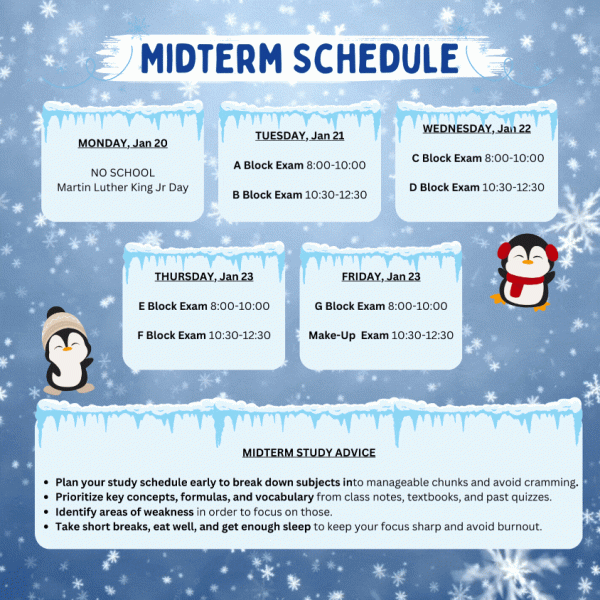How Midterms Impact Students’ Mental Health
Taylor Aptt studies for midterms while trying to manage her stress.
When the final bell rang on January 20th, 2023, HWRHS students felt a sigh of relief escape them. The anxiety and stress that had built up inside students was mostly gone.
Test anxiety is not a new thing, but there are new studies that explore the cause of stress and what can be done to alleviate it.
It is important to understand that test anxiety is not so different from regular anxiety. It’s actually a type of performance anxiety, states Kidshealth.org.
When asked to define the difference between test anxiety and regular anxiety, HWRHS adjustment counselor Sue Howland said, “It’s all the same. It’s just an anxiety response.”
Howland went on to describe the symptoms saying, “Anxiety has very physical symptoms. Stomach, nausea, sometimes throwing up, pulse racing, not being able to sleep the night before for sure, mind racing, it really depends on who you are as a person.”
An article published by Johns Hopkins All Children’s Hospital says “…anywhere from 1 in 10 to 1 in 13 people suffer from anxiety, with about 8% of children and teenagers experiencing an anxiety disorder.”
Most teenagers experience some kind of anxiety whether it’s before a big test, performing on stage, or other situations where they have a lot of pressure to do well. According to Howland, “Everybody experiences some stress in their life. I would describe anxiety as a more kicked-up version of that.”
Prior to taking tests such as midterms or finals, teens can experience some symptoms or signs the day of the test or the previous night. According to Kidshealth.org the most common symptoms are “‘butterflies,’ a stomachache, or a headache,” although some people might feel, “shaky or sweaty, or feel their heart beating quickly as they wait for the test to be given out.”
The question still remains, how can students cope with test anxiety and anxiety in general? Howland thinks the best way to stay calm during stressful times such as midterms is to “know who you are as a learner. Getting enough sleep and being able to really remind yourself and tell your brain that you’re not under attack and that it’s just a test. As important as you think it is or as important as other people make you feel like it is, it is still just a test.”
Being prepared is an important part of lowering levels of anxiety during difficult exams.
Freshman Emily McIntosh says, “I think it is really important to be prepared and to talk with your teachers and ask for help because most likely they want to give you extra support. If you think more positively you will most likely have a better outcome.”
HWRHS senior Paige Skellett says the best way for incoming freshmen to deal with anxiety during important tests like midterms and finals is to “take a deep breath and realize this isn’t a big deal. Do the best you can but at the end of the day remember that this won’t affect your whole life.”
Stress happens, whether it’s around midterms or other events. To help cope be sure you are prepared and don’t be afraid to reach out to adults for extra support.
Clare O’Toole is a freshman at HWRHS and joined the General Consensus recently. Clare wanted to try journalism because she always wanted to write for...











